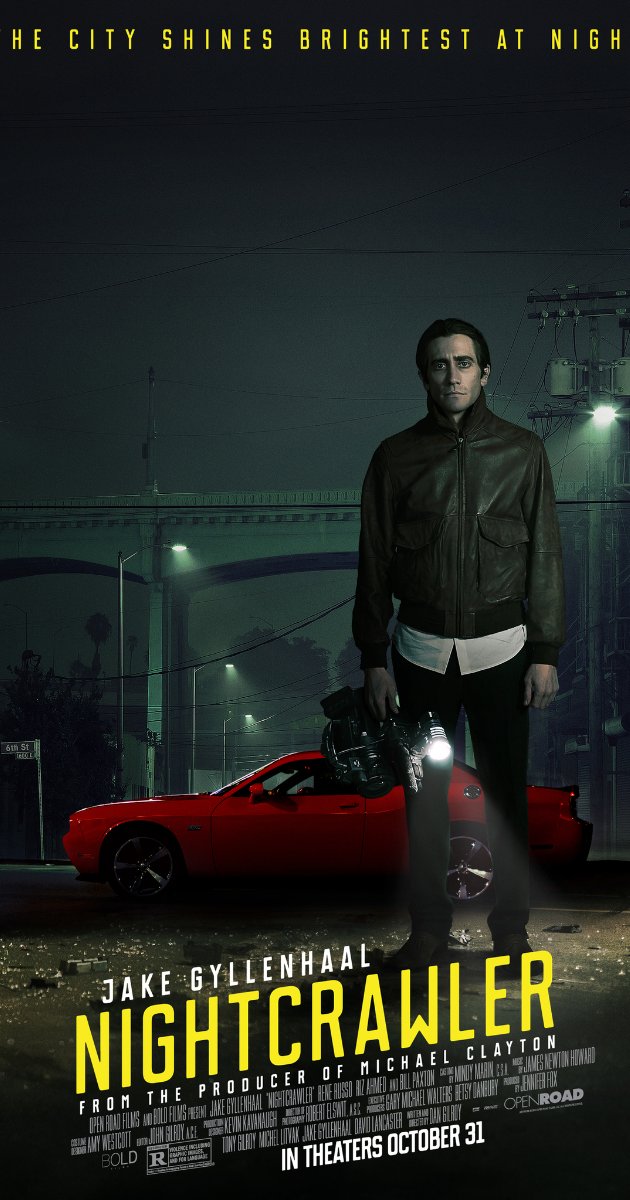
Two Things:
1. Jake Gyllenhaal will be nominated for an Oscar.
2. Nightcrawler is one of the most honest depictions of the White Fear Narrative on film.

Gyllenhaal plays Louis Bloom, a thief, a liar, and from my observations, a man on the spectrum of some form of neurodiversity. Obsessive compulsive perhaps, or living with some form of high functioning autism. (It was fascinating to watch Gyllenhaal’s face transmit so much dubious thinking behind those intense detail-oriented eyes.) Bloom is a lonely man who scrapes by on the underbelly of society. His white male privilege allows him to steal, beat up people, and sabotage competitors without fear of repercussions from the police. As the renowned comedian Paul Mooney would say, Bloom has “the complexion for the protection.”
Bloom lives in what appears to be an average working-class L.A. neighborhood (his basic studio apartment is as meticulous as his choice of words when speaking), but his only source of income and his only real viable skill is stealing from others. To the casual observer, his freshly pressed clothes, average white guy looks, and cheap car render him almost invisible. He is perceived to be a normal white person. And this perception of “normal” is crucial to his eventual rise in the world of crime journalism—nightcrawling, capturing horrific images of the worst of humanity and selling them to the highest TV network bidder. The bloodier the images the better. These “stringer” clips of film can bring in hundreds and upwards of thousands of dollars depending on who captures the images first and uploads them to the TV station the fastest. The mantra of “if it bleeds it leads” can now be given a dollar value. And the clock is always ticking.
Bloom stumbles across a car accident on the freeway one late night, and for some inexplicable reason, decides to pull over and watch the rescue of a woman from her burning car. As some police officers try to save the woman, a freelance stringer arrives (Bill Paxton in a small but compelling role) and begins filming the rescue operation. Bloom is introduced to his new obsession, TV crime news, and in his compulsive fashion, steals a high-end bike and sells it to get his hands on a cheap video recorder. A TV news starter kit.

Bloom sells his first piece of shaky footage to Nina Romina (Rene Russo), a jaded veteran TV news producer who works at the lowest-rated TV station in Los Angeles. Nina tells Bloom that he has a good eye, and with this bit of encouragement (and his intense obsessive nature) Bloom sets off to take crime journalism by storm. He buys a police scanner and even hires his first crew member (Riz Ahmed in a heartbreaking role as a marginalized Guy Friday just desperate enough to endure Bloom’s reckless behavior).

Bloom is heckled by Paxton for being slow to big stories, and this disrespect spurns Bloom to be the best in the biz. Being the best means manipulating the raw footage before Nina gets her hands on it. The film moves into even darker territory when the quest to impress Nina and one up Paxton taps into Bloom’s deceitful nature: he now begins staging crime scenes by moving bodies, rearranging evidence, and omitting images to play up white fears of crime from the urban areas creeping into lily white suburbs. Nina even tells Bloom that the best stories are “A woman running down the street with her throat cut.” The implication here is a preference for white women because they illicit the most sympathy from white mainstream audiences. White news producers play up the recycled white woman in distress angle so often that it has become banal today.


It’s a narrative used since the early 17th century. This narrative provides high viewership numbers, and Nina needs high ratings or she will be sacked by her bosses. Nina is unapologetic about framing whiteness as the center of the universe and churning out fear-based stories that disrupt the sanctity of white comfort. She is so apathetic about it, that she appears to dismiss how this narrative implicates her in upholding white supremacy, patriarchy, and the erroneous belief that whiteness is the be all to end all. This makes the film brutally honest. It does not sugarcoat what all non-white Americans understand from jump: the implicit bias of the American mainstream media. The centering of whiteness and white comfort are the only stories worth telling and protecting. And I applaud that honesty in this movie. It made me angry too since I am someone who comes from the margins of society trying not to be marginalized on a daily basis. At the same time, I give serious props to the writer/director Dan Gilroy. He gives it to you straight with no chaser. As much as I grew to loathe Bloom, I was still compelled to see him through to the end. He’s a real punch in the gut. And Gyllenhaal is simply brilliant in his portrayal of a man I want to see burn for his transgressions.

Eventually Bloom films the biggest story of his new career, a home invasion in an exclusive suburb, with plenty of blood, guns, and bodies, including a missing baby. He arrives at the scene before the police and enters the home filming every gory detail, including the murderers who escaped before Bloom entered the house. He withholds the footage of the killers and their SUV license plate. He has plans to keep the story going by following the so-called “Horror House” murderers and setting them up for a bigger news story– a future staged police shootout he will capture on film. He will control and manipulate white public fear. Because he can.

When Bloom shows the pre-edited Horror House footage to Nina, I swear her face appears orgasmic as she savors every bullet hole, and every inch of blood splatter. It seriously looks like she’s getting the best sex of her life. Nina calls in the newsroom lawyer to see how much she can get away with showing on live TV. As long as the victim’s faces are pixelated and the home address isn’t given out, it’s a go.
This move spins the story into a new direction with the appearance of the police who want to confiscate all the footage of the Horror House crime scene. Nina sends them to Bloom’s home, and no-nonsense Detective Fronteiri (Michael Hyatt) is determined to solve this case. From the moment she enters Bloom’s apartment, Detective Fronteiri knows he’s a conniving liar.

Later, when Bloom sets into motion the tragic events that will net him his biggest stringer payday yet, Detective Fronteiri has to concede that she can never prove Bloom’s willful obfuscation, but she lets him know that she is aware of his deceit. He withheld crucial evidence to make a name for himself. And there are chalk lines on the ground for unnecessary deaths because of this deceit. In her eyes we see that she understands that he is controlling the false narrative of events. He has painted himself as a white victim who feared for his life and safety, and only called the police when he thought some big bad Latinos were following him. In reality, he planned to capitalize on the script he had pre-written for others to play out, including the Latino bad guys. He is the puppet master who pulls the strings. Detective Fronteiri knows this but is unable to take Bloom down. And Bloom gets to prosper in the end and continue nightcrawling with a brand new crew of underlings who have no idea that he has sociopathic tendencies. He just looks like a clean cut articulate white man with ambition. Y’know, the good guy.
The core story of Nightcrawler is how the media, TV news in particular, controls and manipulates the cultural discourse that portrays whiteness and white privilege as tangible things to be protected in America. Whiteness takes preeminence over non-white individuals and cultures. Non-white individuals in news stories are always seen as the scary Other, disrupting the comfort of good white folks–especially good white folks who live within high income zip codes. Fear-based media sells and it goes hand-in-hand with the threat of white comfort. Any challenge to the white comfort narrative is an assault on the perception that whiteness is the norm. Challenges to that white comfort norm are often rendered meaningless and worse, pathological. Look at real life TV news. Black Americans like Trayvon Martin, Renisha McBride, Marissa Alexander, Mike Brown, Tamir Rice, Jordan Davis, Eric Garner et al, are victims of police violence, violent anti-Black citizens, majority white jurors with irrational fears of Black skin, and the racist court of public opinion that puts Black victims on trial with immediate character assassinations. This violence done to Black Americans is used to uphold the sanctity of white comfort, and the delusions that white privilege perpetuates. Nothing in the media is happenstance. It is created, shaped, edited, and shared on television and the internet to protect a perceived white normality. All hail Hydra, darkies be damned.

Perceptions of fear-based news do not match reality. Recently, Rudy Giuliani (in a television debate with Professor Michael Eric Dyson) tried to conflate Black-on-Black crime as an excuse to ignore state sanctioned violence on Black bodies, many of whom are children. He failed to mention white-on-white crime, or how most violent crimes are perpetuated by loved ones people already know. He misused facts to be obtuse and to derail the #BlackLivesMatter conversation on social media, once again centering the white fear narrative, and painting Black people for the zillionth time as the monstrous Other, the boogie man that has to be kept in check by more police crackdowns on Blackness. He became part of the media-created frenzy used to frighten good suburban white folk. The perception he tried to paint didn’t match the reality of the discussion. Much like the TV producer Nina, when faced with a counter-narrative that didn’t match the story she was trying to sell, Giuliani stuck to his erroneous script to fan the flames of white centered fear. Truth is more fucked up than fiction.
The power dynamics between Bloom and Nina is an engaging interplay of sexual tension, and sexual manipulation. At the start of the film, Bloom is Nina’s subordinate, her little free-lance worker bee. Halfway through there’s a shift in the relationship, not quite equal, but Nina does treat him like a colleague. Bloom wants Nina sexually, and when he’s done his painstaking research on her career failures and her desperate need to keep her job, he calculates that he is worth more to her professionally than she lets on and uses this truth to pressure her into a date, and soon after, a sexual relationship.




One reading of this sexual coercion can be viewed as blackmail and harassment. But Rene Russo imbues Nina with a calculated agency that can also be interpreted as a woman who also knows her worth to Bloom, and uses his desire for her to get what she wants. I also sense that Nina actually finds Bloom attractive, especially when he makes demands of her. The same sexual look she gives bloody images is the same look she gives Bloom when he tries to dominate her. A lesser script would’ve used this tension as a subplot for Nina to rise above Bloom’s coercion. Instead, Nina concedes, has an off-screen relationship with him that we don’t see, and it is a stunning tête-à-tête to witness. It may very well gain Rene Russo her own Supporting Actor nod come Oscar season.
Nightcrawler is a wonderful respite from the big budget tent-pole films dominating the cinema. Original, daring, infuriating, and honest about ugly truths, I expect Jake Gyllenhaal to see his name on the Best Actor Oscar Ballot. He might even walk away with that gold statuette. And I would applaud him for it.


_______________________________
Lisa Bolekaja is a graduate of the Clarion Science Fiction and Fantasy Writer’s Workshop and was named an Octavia E. Butler Scholar by the Carl Brandon Society. She co-hosts a screenwriting podcast called “Hilliard Guess’ Screenwriters Rant Room” and her work has appeared in “Long Hidden: Speculative Fiction from the Margins of History” (Crossed Genres Publishing), “The WisCon Chronicles: Volume 8″ (Aqueduct Press), and the SF/F anthology, “How to Live on Other Planets: A Handbook for Aspiring Aliens” (Upper Rubber Boot Books). An associate member of the Horror Writers Association, and a former Film Independent Fellow. She is a profesional agitator on Twitter @LisaBolekaja




